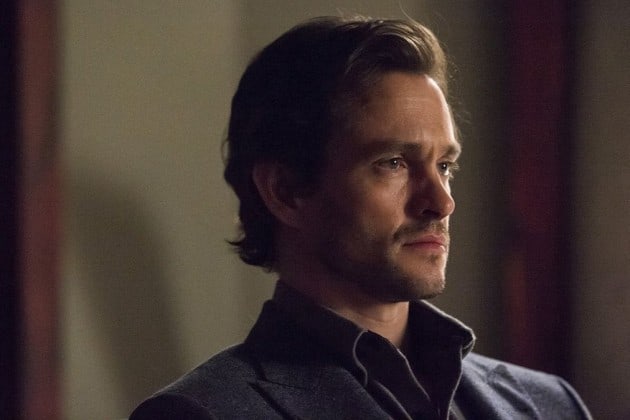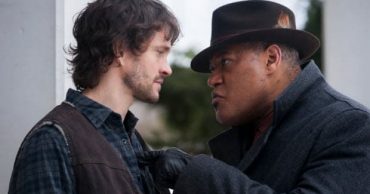
The last three episodes of Hannibal have pivoted around a central set piece. “And the Woman Clothed in Sun” featured one of the series’ most poignant moments in Reba’s visit with the tiger. “…And the Beast from the Sea” struck terror with the Dragon’s home invasion and Molly and Walter’s escape. This week, Frederick Chilton finally returns to the spotlight in his encounter with Dolarhyde. Big moments like these, while common in television in general, have rarely been Hannibal‘s game, as the series has gone for quieter scenes of contemplation or else has built to minor and major climaxes across multiple episodes. These three sequences from the last three episodes, though, fall in line with the becoming of Francis Dolarhyde (all three feature Armitage’s character), which necessitates key moments like the development of any person would, in fiction or in reality–you can often remember your own key developmental moments. But while the Dolarhyde-Chilton stuff is the key moment in “The Number of the Beast is 666…,” the dressing around it–and this is also the case with the other two episodes–adds more and better context, giving it its power. Bedelia comments directly to that in her second session with Will: “Touch gives the world an emotional context. The touch of others makes us who we are.” Although sight has been the most prevalent sense in both Hannibal and Thomas Harris’ Lecter mythology, touch is elevated in importance in this episode and gives us our own emotional context.
The role of touch is obvious to the point of being too redundant to talk about in the tiger scene from two episodes ago. In the home invasion, sight is mired by darkness (we see much more through the camera while in the house than any of the characters would have with just faint moonlight), and though hearing is a massive aid to Molly and Walter, the touch of his mother is what makes Walter understand their situation. Touch is also everywhere during Chilton and Francis’ discussion. From the moment he wakes up, Chilton wonders why his back hurts and if his skin has been burned. Again, sight and sound are also bright and echoing–hard to ignore the power of Armitage repeating “Do you see?”–but touch is what we’ll remember most regarding this episode years from now (and a very unpleasant memory that will be, since we’re better off not wondering about how it would feel to have someone bite our lips off). It’s not until Will hears the screams of Chilton as Dolarhyde is physically attacking him that he bends down to feel the weight of his participation, and when the scene transitions into Bedelia’s room, Will is touching his own arm and hand as if to ground himself in reality.
Bedelia’s comment about touch is aimed at the way Will puts his hand on Frederick in their photo together. That gesture is also the one that gives Chilton emotional context. The way he understands it after the fact is that Will was touching him like a pet (or the way Chilton would define a normal relationship with a pet; darkly humorous enough, we know that Will would treat a pet much, much better than he would Chilton). Will, however, admits that putting his hand on Chilton’s shoulder was to establish authenticity. The “touch of others,” as Bedelia puts it, goes both ways, I think. When touching occurs, even if one person initiates it, the initiator still feels the touch of the initiated, and so if the touch of others helps make us who we are, Chilton’s touch has taken Will away from the person he wants to be. His controlled shudder at the thought of his own hand being Hannibal Lecter’s agency in the world both confirms that and makes us wonder if Will is so far removed from the person he wants to be–the person he used to be–that this is all he is now.
Stubborn beyond recognition, the touch of others and their effects are things Chilton has yet to truly comprehend (maybe now, though). They have made him a patsy and have taken away his some of his innards and now multiple parts of his face (oh, and several layers of skin). As a viewer, it’s sometimes fun to revel in the torture of Frederick Chilton, because Raul Esparza brings out his megalomania so fully. But what Dolarhyde does to Chilton is sufficient emotional context enough to shift that slight problem back into focus. It also reminds us that his relationship with Reba isn’t enough to humanize him so that the beast within him isn’t what we see.
There may have been a time when we could have sympathized with how the touch of others turned Francis into what he would become. We saw a glimpse of a rather ominous scene from his childhood, and his “changing” of others certainly signifies coming from a place of physicality in his past. Yet, that moment has passed, and the way Dolarhyde touches people confirms what he is–want he wants to be, or what he is willing to become. Sensory detail has always been an asset of Hannibal, and I’m often engaged by how it focuses on the senses where other series would focus on other devices (plot, most notably, which is something I don’t find very interesting anymore, but it is the thing that usually defines viewers’ relationships with a series). “The Number of the Beast is 666…” is no exception to this. You can easily fit it into the context of the penultimate episode that is supposed to be table setting for the finale–the episode that sets up the pieces rather than offering resolution with major arcs. And sure, this episode probably ticks those boxes. But we may only have one episode of Bryan Fuller’s Hannibal left, so rather than looking at the episode in that context–analyzing choices of adaptation, commenting on performances, assessing believability and engagement–better to consider what the text is addressing more abstractly. The touch of others makes us who we are. How has the touch of Hannibal made you who you are?
Bite-Sized Thoughts: Buon appetito!
– Apologies, I’m away on vacation this week, so I won’t have time for “Hannibal by the Numbers” (I’ll try to add it in within the next few days). The one note I made for that was that, if you allow for the commercial break and the slight jump in time when we don’t see what Chilton says to the camera while it’s happening, the Chilton-Dolarhyde sequence runs 13 minutes and 35 seconds, which is now the new reigning champion of the longest in the series.
– The tale of Bluebeard’s wife is actually pretty horrific and would have made for great Hannibal material if there had been time to take it on an extended metaphor ride.
– “Is Hannibal in love with me?” “Could he, daily, feel a stab of hunger for you and find nourishment at the very sight of you? Yes. But do you ache for him?” Tell it like it is, Bedelia. The fans love hearing it.
– Hannibal and Jack break down everyone’s roles in their conversation about lambs, gods and dragons. Note that next week’s episode is titled “The Wrath of the Lamb,” which would suggest what? That Will is going to kill everyone! Ha! But seriously, expect some revenge for the things Hannibal and Dolarhyde have done to Will.
– Hannibal balks at the idea of Chilton being his nemesis. He’s not made of proper stuff.
– “Fate has a habit of not letting us choose our own endings, Frederick.” I tried to look this up, but I couldn’t find anything. We had a line like this before, right?
– Anyone want to buy a “The Tooth Fairy is a One-Night Stand” T-shirt?
– Hugh Dancy really gets to have some fun during his and Esparza’s joint interview.
– “This is the child of a nightmare.” Will notes when Chilton says this. Why?
– Note that Chilton’s dialog almost entirely eschews contractions. Plenty of “I am” where most people would say “I’m.” This contrasts sharply with Dolarhyde’s own speech patterns.
– Hannibal delights in Chilton’s misery. “This one can provide you anything the other one can.” Big smile.
– See you next week for the finale!
[Photo via NBC]
 Follow Us
Follow Us





